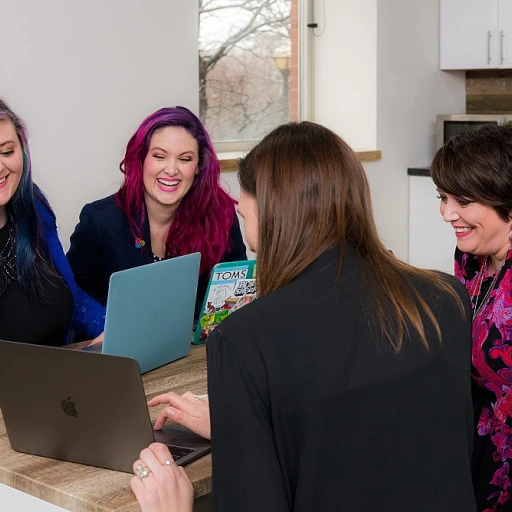
Understanding the Growth Mindset
Cultivating a Positive Approach to Difficulties
In the fast-evolving landscape of entrepreneurship, understanding the growth mindset can be a game-changer. A growth mindset is the belief that abilities and intelligence can be developed through dedication and hard work. This contrasts with a fixed mindset, where individuals perceive their skills as static and unchangeable. Nurturing a growth mindset within a team can lead to increased employee engagement, professional development, and ultimately, business success.
Creating an environment that supports continuous learning is crucial. Encouraging a mindset where employees see mistakes as opportunities to learn rather than failures can transform challenges into vehicles for employee growth. This approach echoes the philosophy that effort and problem solving are essential components of success.
By fostering a culture that values individuals' growth and celebrates the journey of learning, organizations can encourage team members to push beyond their perceived limitations. Such a mindset not only enhances employees' skills but also empowers them to contribute more effectively to team and organizational development.
For those seeking further insight on fostering a progressive mindset, the power of personalized mentorship can be an invaluable resource. Mentorship plays a pivotal role in helping individuals and teams embrace learning and growth culture.
Creating a Culture of Learning
Building a Learning-Oriented Culture
Creating a culture that values growth and learning is crucial for the success of any business. This involves embedding a continuous learning mindset within your team, encouraging them to embrace challenges and view them as opportunities for professional development. A learning-oriented culture not only cultivates personal and employee growth, but also enhances the organization’s adaptability and problem-solving capabilities.
To effectively nurture a culture focused on learning, entrepreneurs must facilitate an environment where employees can freely experiment, take calculated risks, and see failures as stepping stones towards improvement. Developing growth in team members involves promoting a mindset that prioritizes effort and hard work, while gently steering away from a fixed mindset that resists change and development.
The presence of a supportive learning development (L&D) framework can play a significant role in encouraging individuals to expand their skills. Through strategies such as interactive workshops, mentorship programs, and hands-on projects, employees can gain practical insights and experience real-world applications of their skills, ultimately fostering a lasting growth mindset in the workplace.
Moreover, leadership that champions ongoing learning is key in building a mindset culture where feedback is constructive and roles evolve as opposed to being finite. This kind of based leadership inspires employees to envision their success intertwined with continuous personal and organizational learning.
To explore more effective strategies that can inspire your team and contribute to a thriving learning culture, consider reading this insightful blog post.
Encouraging Open Communication
Encouraging Transparent and Effective Communication
Fostering open communication is crucial for developing a positive learning environment within your organization. A culture where communication flows freely among leadership and employees encourages shared growth, collaboration, and problem-solving. When team members feel their voices are valued, they are more likely to contribute to the team's success and adapt a growth mindset. To cultivate open communication:- Create Safe Spaces: Establish channels where employees can express their thoughts and ideas without fear of criticism or reprisal. Regular feedback sessions and open-door policies help in building trust among team members.
- Promote Active Listening: Encourage leadership and employees to practice active listening to understand various perspectives thoroughly. Recognizing different viewpoints fosters an environment of inclusivity and mutual learning.
- Leverage Technology: Utilize communication tools that facilitate seamless interaction among remote or distributed teams. Tools that support video conferencing, instant messaging, and collaborative workspaces can enhance the dynamic flow of information.
- Regular Check-Ins: Implement regular team meetings and one-on-one sessions to review objectives, discuss challenges, and offer supportive feedback. This keeps goals aligned and encourages continuous learning.
Setting Challenging Yet Achievable Goals
Establishing Attainable Ambitions
Embracing a growth mindset involves setting ambitious yet realistic goals that motivate individuals and teams towards continuous learning and professional development. A clear road map of objectives helps the employees understand their role in the overall business strategy and fosters a mindset culture that encourages creativity and resilience.- Align goals with employee growth: Goals should stretch the skills and capabilities of employees without overwhelming them. Encouraging individuals to step outside their comfort zones while providing the necessary support will help in developing growth in the mindset culture.
- Incorporate problem-solving tasks: To cultivate problem-solving skills, incorporate challenges that promote critical thinking within the work environment. This nurtures a mindset workplace where employees learn from their experiences and adapt their strategies, leading to greater success.
- Balance between growth and immediate objectives: While ambitious goals are essential, ensure there’s a balance with more immediate, attainable objectives. This approach not only prevents frustration but also nurtures a learning culture giving employees the chance to experience quick wins as they work towards larger ambitions.
- Regular review and adjustment: Setting goals is not a one-time activity. Regularly review and adjust them based on feedback and changing business landscapes to ensure they remain relevant and aligned with the organization's vision and market conditions.
Recognizing and Rewarding Effort
Celebrating Effort as a Catalyst for Growth
In the journey of fostering a growth mindset within your team, recognizing and rewarding effort is pivotal. This approach not only motivates employees but also reinforces the idea that hard work and perseverance are valued over innate talent. By acknowledging the dedication and resilience of your team members, you cultivate an environment where continuous learning and development are prioritized.
When employees see their efforts being appreciated, it encourages them to embrace challenges and view setbacks as opportunities for growth. This shift in perspective is crucial for developing a growth mindset, where individuals are more likely to engage in problem-solving and innovative thinking.
Consider implementing a system that highlights and rewards the efforts of your team. This could be through formal recognition programs or informal acknowledgments during team meetings. The key is to ensure that the focus remains on the process and the learning journey, rather than just the end result.
Moreover, by celebrating effort, you send a clear message that your organization values a mindset culture that supports employee growth and development. This not only enhances individual growth but also contributes to the overall success of the business. As employees feel more valued and motivated, they are more likely to contribute positively to the team's objectives and the organization's goals.
Providing Constructive Feedback
Delivering Effective Feedback for Growth
Feedback plays a seminal role in fostering a growth mindset within your team. To nurture a learning mindset, entrepreneurs must focus on providing feedback that aligns with both individual and organizational development goals. Here's how you can offer constructive feedback that encourages employees to embrace challenges and foster continuous learning:- Be Specific and Accurate: Ensure that the feedback is clear and directly related to the task or behavior at hand. General comments often lead to misunderstandings, whereas precise feedback helps team members identify specific areas of improvement.
- Focus on Effort and Strategy: Acknowledge the hard work, strategies employed, and perseverance demonstrated by employees. Emphasizing effort over innate talent encourages individuals to adopt a growth rather than a fixed mindset.
- Encourage Problem Solving: Encourage team members to use feedback as a tool for problem solving. Ask questions that promote self-reflection and inspire employees to find their own solutions, fostering a mindset culture of autonomy and innovation.
- Provide Regular and Timely Feedback: Offer feedback frequently rather than waiting for annual reviews. Regular feedback helps employees track their progress over time and makes it easier for them to learn and adapt.
- Create a Safe Environment for Exchange: Promote a workplace culture where feedback is a two-way street. Encourage employees to voice their thoughts and concerns, creating an open dialogue that reinforces trust and transparency.
- Link Feedback to Goals: Tie feedback to specific business goals or outcomes, making the feedback relevant and actionable. When team members understand how their personal growth contributes to the overall success, they are more likely to embrace further challenges.













